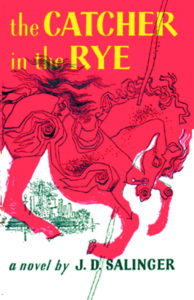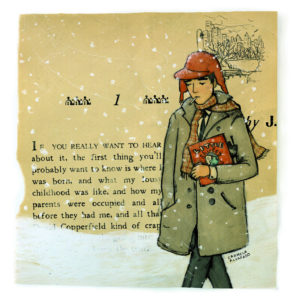
The Catcher in the Rye (1951): Book Cover
Hello again, class.
Back when I wrote about Alice’s Adventures in Wonderland, I talked about children being mistreated and not fitting in with Victorian England’s rules. Wonderland is a metaphor for the strangeness of adulthood; Salinger’s The Catcher in the Rye is less figurative and more realistic, but it makes a similar claim for adulthood. The real tragedy of The Catcher in the Rye is not that children are mistreated; it’s that they are ignored.
Let’s look more closely…
The hero of the hour is Holden Caulfield (officially one of my least favorite names), a sixteen year-old kicked out of yet another prep-school for failing every class but English. Over the course of three days, Holden bails from his dorm and takes a strange journey around New York, involving everything from nuns and cab drivers to prostitutes and pimps, eventually finding his way home.
Unlike in Alice, whose helpful narrator helps explain Alice’s predicament, Holden is always speaking directly to us. As a sixteen year-old, he is explicit with language and content, but there are also things Holden deliberately leaves out. He is trapped in his own head, and he isn’t aware of what’s happening to his psyche. That means this book is meant to be deciphered (puzzles!!).

The Catcher in the Rye: First Lines and an Illustration
Speaking of what was meant to happen, Salinger’s intentions were especially interesting. This book was written for adults, as a way of revealing the emotions and thoughts of children that society ignores. This makes Holden’s age a careful choice—he is beyond childhood innocence, but he shuns maturity and adulthood, so he is caught in the middle. As a result, Catcher has become an inspiration for teenagers in rebellion; Holden’s violent thoughts, potent imagination, and social aversion became rallying cries for teenagers that feel ignored, want to be left alone, and hate the established order of the world (as stereotypical these attributes sound, part of Salinger’s point is that rebellious teenagers are not a stereotype).
Salinger’s intentions were also tragically misunderstood in the resulting attacks on President Ronald Reagan and John Lennon. I haven’t been able to research the full extent of these stories, but both attacks are said to be inspired by The Catcher in the Rye. For an extra frightening factor, the movie Chapter 27 is a fictionalized account of the assassination of John Lennon, named for the 26 chapters in Salinger’s novel.
But in the end, these external facts have clouded the importance of the novel itself. I was reading it for the first time and expected some kind of violent, tragic end, especially with all of the references to his own insanity and the recurrence of his red hunting hat as a symbol. Fortunately, the story is not so predictable. If you read it yourself, I recommend leaving an open mind about what kind of person Holden is—don’t just sympathize with his isolation, but empathize with his quest.
And yes, there is a quest—even if its not on the surface. Holden’s quest is about happiness. No matter what physically happens to him, he is searching for something to take comfort in…something to give him hope and peace. Underneath Holden’s chaotic odyssey is a relatable emotional journey.
I’d like to hear from you: what were your own thoughts on Catcher in the Rye? It’s gone from banned reading to studied carefully in high school classes, so I look forward to the spectrum of thoughts here.
Next up, I’m reading The Grapes of Wrath, another kind of odyssey. I hated it in high school, but I look forward to giving it another chance. Some things can’t be enjoyed in high school.
Until next week,
Prof. Jeffrey
Recent Comments